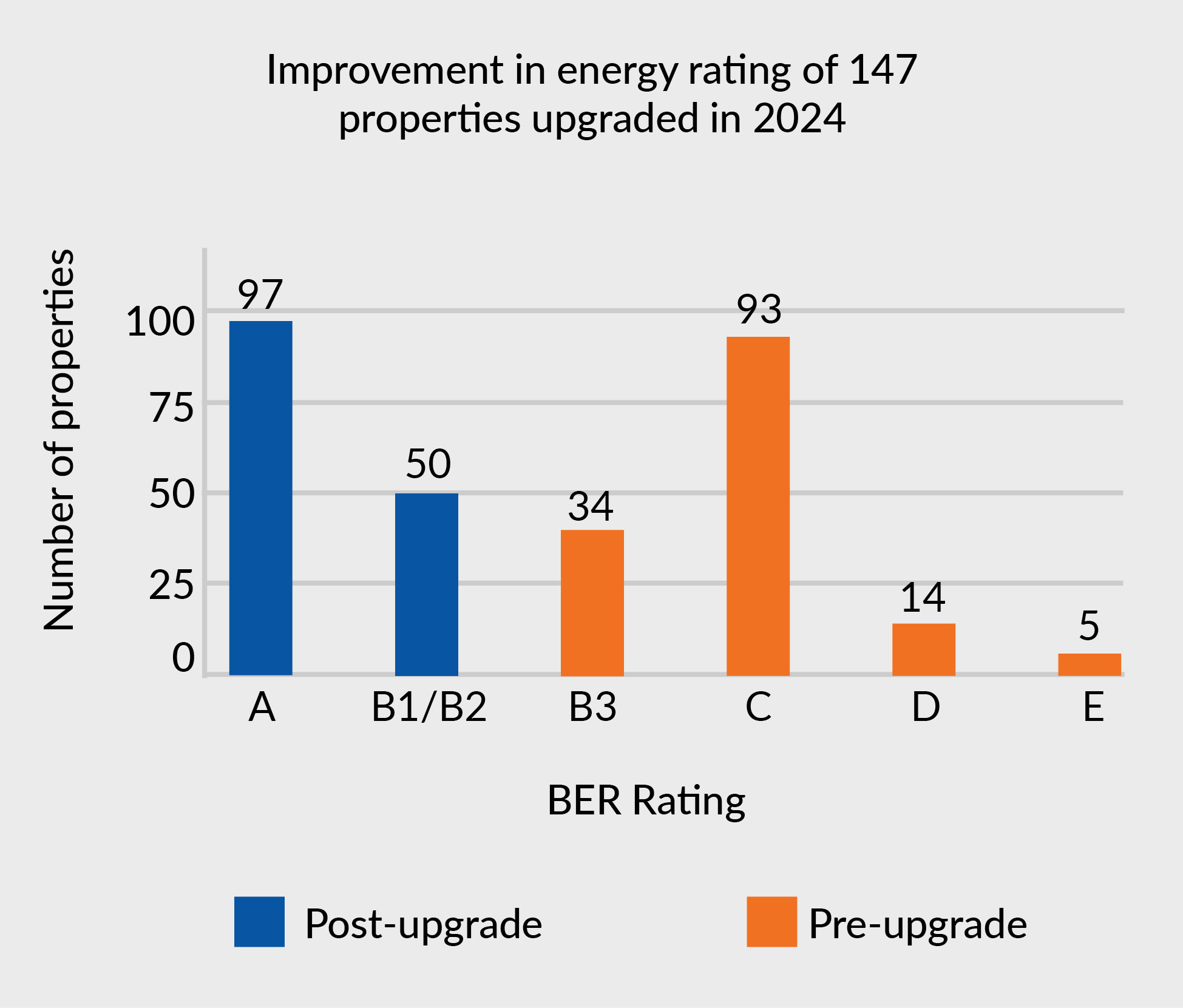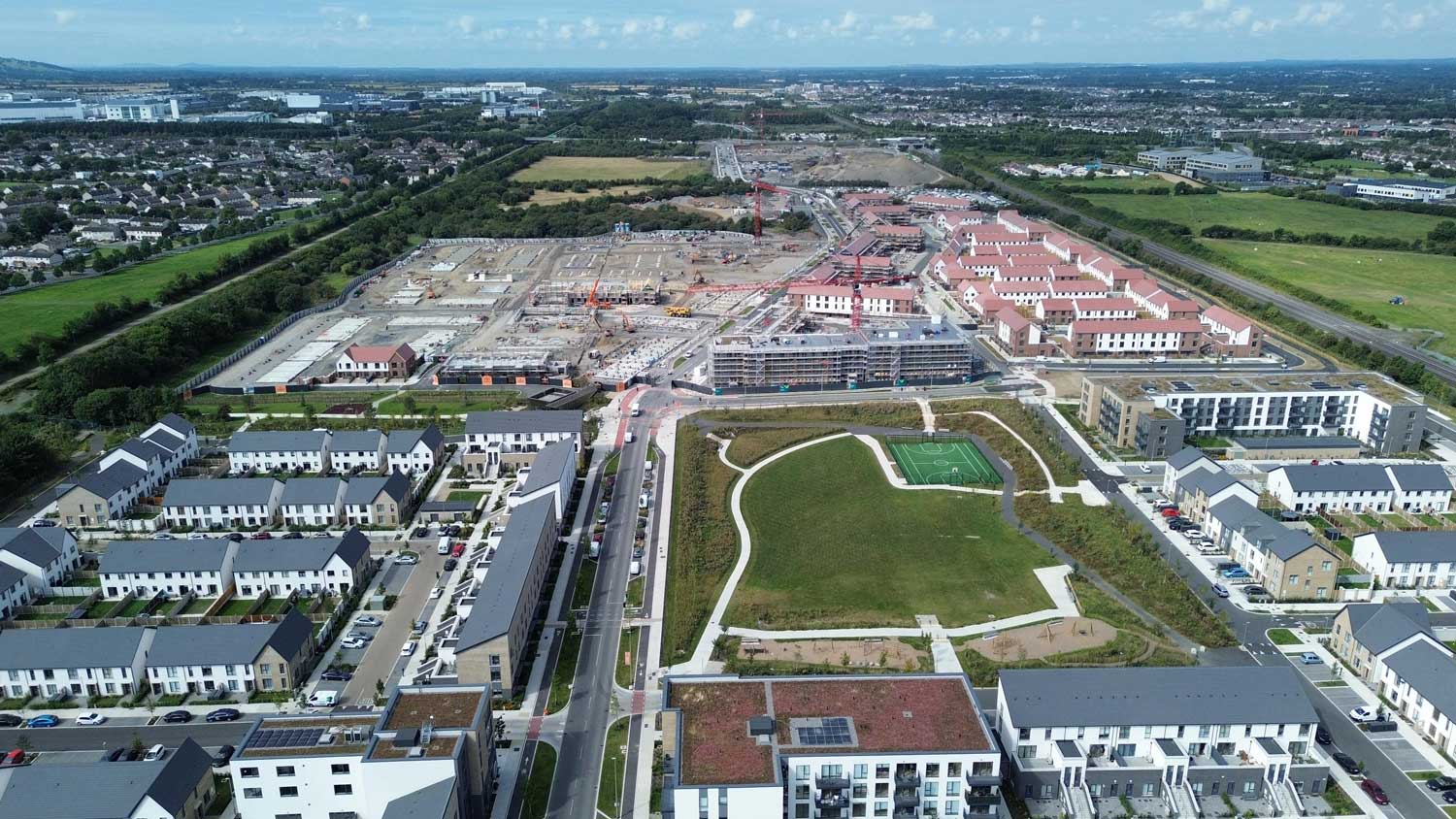Image: Istock
Delivering sustainable homes for Ireland
How Tuath Housing is tackling the climate crisis

INNOVATION & IMPROVEMENT

Jennifer Whitty
Sustainability Manager, Tuath Housing Association

Jennifer Whitty
Sustainability Manager, Tuath Housing Association
Issue 80 | October 2025
Tuath Housing Associationʼs work encompasses property development, housing management, community management and asset management, with more than 16,000 homes and growing. As a not-for-profit Approved Housing Body (AHB), we have a core social purpose, so embedding sustainability goes hand-in-hand with our values.
As any organisation begins to introduce sustainability more strategically, it can seem overwhelming. So for those new to the topic, here are some of the ways Tuath Housing has approached sustainability, involving a combination of simultaneous planning, doing, rethinking… and repeat!
Planning and measuring
Tuath’s sustainability team first developed a sustainability framework and charter in 2023, focusing on environmental and social sustainability goals while ensuring the right governance aspects were in place for proper oversight. A materiality assessment ensured our stakeholders were consulted on what they consider important topics for the organisation to focus on.
Tuath first measured its carbon footprint at this time and continues to do so annually. While there are some limitations to the data, we can begin to see the impact of our energy upgrade programme and how the addition of A-rated homes and renewable energy have positively impacted our own carbon footprint. Having these insights improves our knowledge on where we are on our decarbonisation journey.
Staff engagement and training
Cross-departmental sustainability training was introduced in 2024. Often, staff may not know how to relate sustainability to their job or why they should. Our sustainability training explains why itʼs important and why we need to act fast. It also explains the evolution of regulatory and policy changes designed to address the environmental crisis, what it means for Tuath Housing and how every department can feed into the delivery of the sustainability roadmap.
Keeping ahead of regulatory developments is crucial. Having a sustainability team is important as they will be familiar with the sustainability standards and regulations and how to identify key areas of focus.
One example is the upcoming European Performance of Buildings Directive (EPBD), which will impact across the value chain from construction materials producers and contractors, to developers and property owners. It will require that Life Cycle Assessments (LCAs) are carried out on buildings over 1000m2 from 2028 and on all buildings from 2030.
This will involve calculating the carbon emissions associated with the building throughout its lifetime including those in the products used, the construction itself, from the building while in use and at its end of life. This year, Tuath is starting to examine this important and complex area and engaging design teams on the issue.
Doing and rethinking
In recognition of the need to decarbonise, an energy upgrade programme has been underway at Tuath since 2020. Nearly 600 homes have now been upgraded to BER B2, resulting in significant improvements to tenant comfort and wellbeing.
Continuing with business as usual won’t solve the crisis. This is where innovation is important. Availing of funding opportunities will give AHBs the opportunity to pilot innovative solutions and lead the way in climate action. For example, Tuath is a partner in an Interreg North-West Europe funded project called ‘Circular Reno’. This aims to implement bio-based materials in home retrofits and create an action plan to address housing and energy challenges.

Cairn Homes' mixed-tenure Whitehaven development in Santry, Dublin, will be one of the most sustainably designed apartment schemes of its scale in Ireland, consisting of 174 Cost Rental homes and 81 social homes.
Tenant engagement
Later this year, Tuath will acquire one of the most sustainably designed apartment schemes of its scale in Ireland, providing both our cost rental and social housing tenants with superior levels of comfort. Built to Passive House (or Passivhaus) design standard, these homes will require minimal space heating and provide much-improved comfort levels for our tenants.
We are planning tenant engagement on the essential elements of Passive House living, acknowledging that many modern homes have new technologies that may not be familiar to either staff or tenants.
Engaging tenants on sustainable living topics is a long-standing aspect of our work, collaborating on issues such as waste and recycling, community gardens, biodiversity, and sustainable travel, while empowering communities to take action themselves.
Last year, we surveyed our residents on the topic and had a phenomenal response rate, showing how deeply people care about sustainability. 85% of respondents expressed concern about climate change and 98% said energy efficiency in the home was important to them.
As a result of this feedback, Tuath created the first ever Climate Action Resident Fund. Resident groups can submit proposals to enable them to undertake projects focusing on sustainability in their own communities.
Keeping up momentum
This is just a snapshot of some of the topics we have been addressing. Our 2024 ESG report will be published in the coming weeks and is a first for the sector in that it will be using a global sustainability standard (GRI) to disclose our sustainability metrics.
A lot has been done but in some ways it feels like we’ve barely started. There are many challenges and a lot at stake. No one individual, one housing association or even one country or continent can fix the climate crisis alone, but we can all be part of the solution.
“No one individual, one housing association or even one country or continent can fix the climate crisis alone, but we can all be part of the solution.”

